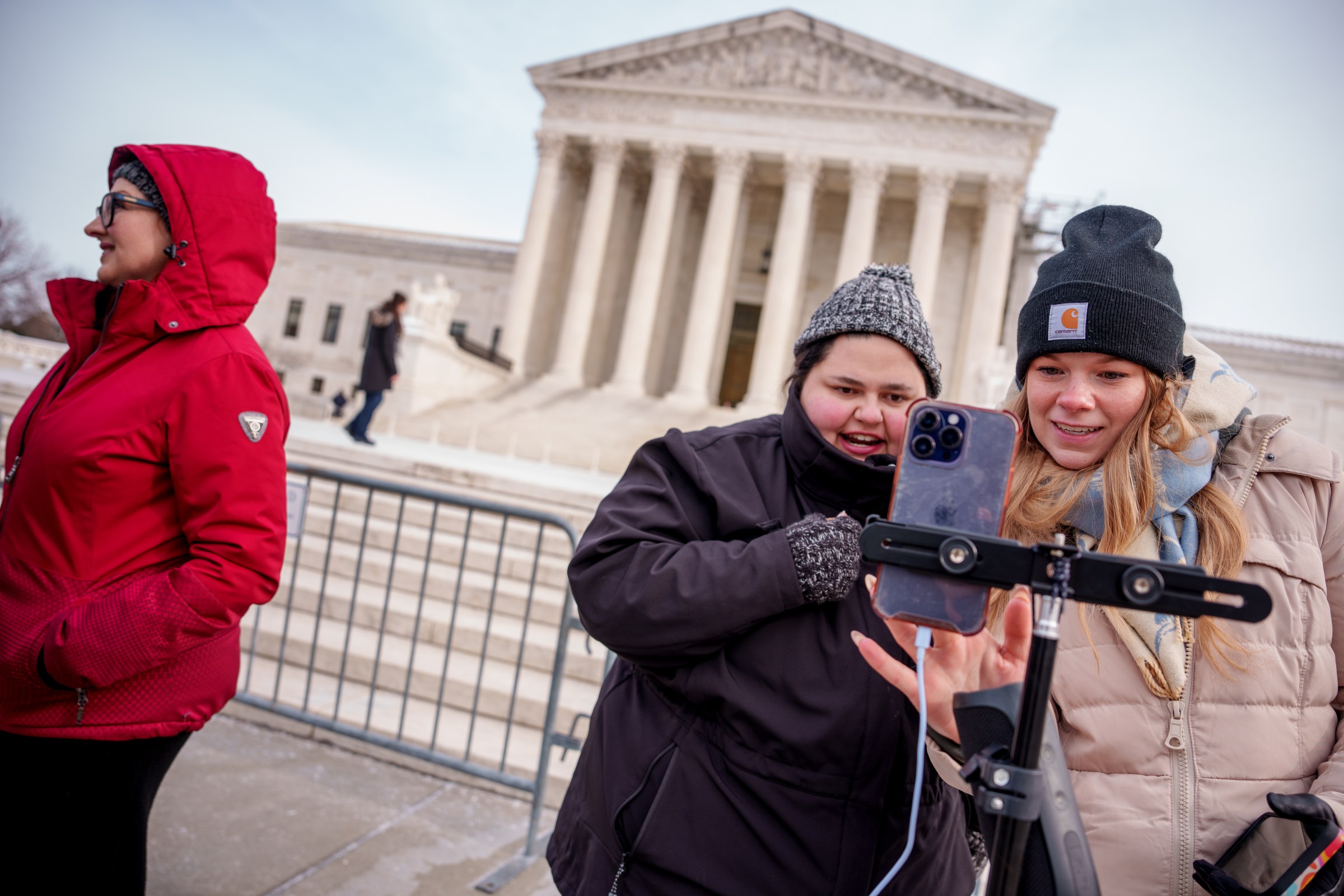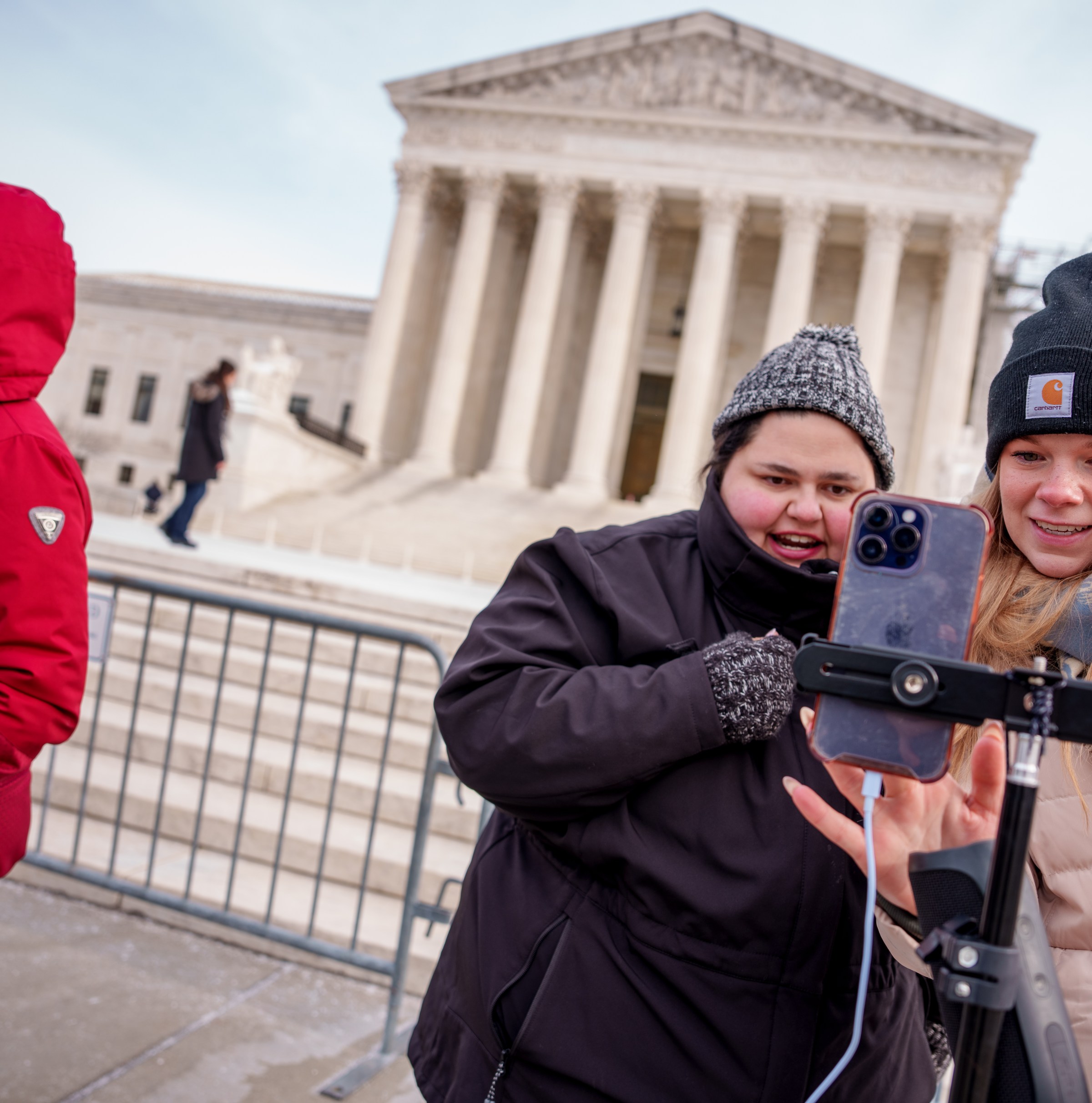Imagine that the government tried to force Jeff Bezos, the Amazon billionaire and owner of the Washington Post, to sell that newspaper due to concerns that Bezos might order his paper to publish subversive content. No competent judge would uphold such a law, which obviously violates the First Amendment’s free speech protections.
TikTok should lose its big Supreme Court case
The Supreme Court case asking if the government can ban TikTok is easier than it looks.


The Supreme Court has said time and time again, over many different contexts and in cases involving myriad forms of media, that the government may not dictate what is or is not published by media companies, or how those companies make editorial decisions.
And yet, the facts before the Supreme Court in TikTok v. Garland, a case the Supreme Court will hear on Friday, are strikingly similar to this Bezos hypothetical — which likely explains why Bezos plays a prominent role in TikTok’s brief to the justices in that case. TikTok concerns a federal law that effectively requires ByteDance, the Beijing-based company that controls the social media app TikTok, to sell the company to someone less vulnerable to direction from the Chinese government.
The law’s proponents fear that China will use the vast array of data collected by TikTok, a platform with approximately 170 million monthly users in the United States, to spy on Americans, or that the Chinese government will manipulate which content appears on TikTok in order to shape US opinions.
The question in TikTok, in other words, is whether the ordinary First Amendment rule prohibiting the government from deciding who owns media companies must bow to a greater national security interest in preventing America’s most powerful foreign adversary from controlling a major media platform. Congress even named the law targeting TikTok the “Protecting Americans from Foreign Adversary Controlled Applications Act.”
As it turns out, the First Amendment arguments for allowing the government to ban foreign adversaries from owning TikTok are stronger than they may initially seem. As Chief Judge Sri Srinivasan, one of three appeals court judges who upheld the federal law, explained in a concurring opinion, the federal government has a long history of trying to lock foreign nations out of US communications.
To give just a couple of examples from Srinivasan’s opinion, the Radio Act of 1912 only permitted US citizens or companies to obtain a radio operator’s license. That law was repealed in 1927, but, according to Srinivasan, the replacement law prohibited “licensing of any [radio] company if it had a foreign officer or director or if one-fifth of its capital stock was in foreign hands.”
Indeed, current US law prohibits “any foreign government or the representative thereof” from receiving a radio station license, and it broadly bars noncitizens and companies with significant foreign ownership from controlling radio broadcasts.
The TikTok case, in other words, puts two longstanding legal principles on a collision course. On the one hand, the government is generally forbidden from deciding who controls political communications in the United States, and for very good reasons. On the other hand, the federal government has long prevented foreign governments — or even companies that are partially owned by foreign nationals — from controlling important segments of the United States’ communications infrastructure.
Or, as the Justice Department puts it in its brief defending the federal law, “the First Amendment would not have required our Nation to tolerate Soviet ownership and control of American radio stations (or other channels of communication and critical infrastructure) during the Cold War, and it likewise does not require us to tolerate ownership and control of TikTok by a foreign adversary today.”
TikTok is probably going to lose
The law targeting TikTok passed with broad bipartisan support in both houses of Congress. Both President Joe Biden and President-elect Donald Trump (during his first term in office) supported policies seeking to divorce TikTok from ByteDance, at least within the United States — although Trump did file a brief asking the Supreme Court to delay implementation of the federal ban until after he takes office on January 20, claiming that he will “negotiate a resolution to save the platform while addressing the national security concerns expressed by the Government.”
Unless the Court acts quickly, the ban will take effect on January 19. When it does, internet hosting services and tech companies like Apple and Google — which make TikTok available for download on iPhone and Android phones — will no longer be allowed to provide their services to TikTok. TikTok can potentially escape this ban if it is sold to a company that, in the law’s words, is not “controlled by a foreign adversary,” but no sale appears likely to happen soon.
Realistically, it is unlikely that the Supreme Court will rule in TikTok’s favor. Srinivasan is an Obama appointee who is widely considered a strong candidate for the Supreme Court in a Democratic administration. The other two lower court judges who heard TikTok are Douglas Ginsburg and Neomi Rao. The first is a long-serving Republican who President Ronald Reagan briefly tried to promote to the Supreme Court; the second is a Trump appointee mostly known for writing dubiously reasoned opinions protecting Trump and his allies.
So, with this bipartisan mix of judges all agreeing that the government may ban TikTok so long as it is owned by a China-based company, it’s hard to imagine five justices reaching a contrary conclusion. All of the justices sometimes disagree with Srinivasan, Ginsburg, or Rao on a range of political issues that come before the courts. But none of the justices consistently disagree with Srinivasan, Ginsburg, and Rao on any significant political issue.
Of course, even if we assume that TikTok is going to lose this case, it matters a great deal how TikTok loses. The government effectively asks the Supreme Court to rule that well-established First Amendment principles do not apply to China-based companies like ByteDance, even when those companies do significant business in the United States. And it’s not hard to see how such a carveout to the First Amendment could be abused if the Court’s decision is poorly drafted.
Imagine, for example, if the government could order Bezos (or the owners of any other media outlet) to sell his media holdings to a Trump-friendly company, simply by levying false accusations that Bezos has too many ties to China.
But, while the Supreme Court could do great harm to Americans’ free speech rights if it permits the government to decide media ownership based on dubious ties to a foreign nation, a carefully crafted decision permitting the US government to bar foreign ownership of major media platforms would not alter the existing balance of power between private citizens and their government.
What is the First Amendment supposed to accomplish?
It’s easy to get bogged down in the weeds of First Amendment doctrine while thinking about the TikTok case. TikTok argues that this case should be viewed no differently than if the government had targeted Bezos’s ownership of the Washington Post due to a dispute over domestic politics, and thus that the federal law should receive the most skeptical level of constitutional scrutiny. Srinivasan has argued that the government’s long history of barring foreign control of US communications infrastructure calls for a less skeptical approach (known as “intermediate scrutiny”). The Justice Department, in a brief submitted last month, argues that the federal law “does not implicate the First Amendment” at all, claiming that a foreign company like ByteDance has “no First Amendment rights” to begin with.
Rather than dive too deep into these weeds, however, it’s probably best to view the TikTok case through the lens of first principles. One of the primary purposes of the First Amendment is to prevent the government, with its vast array of law enforcement officers who could arrest or kill anyone who antagonizes political leaders, from using its power to control public opinion.
In this sense, the government is unlike any private company or individual, no matter how powerful that private entity may be, because only the government has a monopoly on the legitimate use of force. As the Court recently reaffirmed in Moody v. Netchoice (2024), “on the spectrum of dangers to free expression, there are few greater than allowing the government to change the speech of private actors in order to achieve its own conception of speech nirvana.”
Netchoice squarely presented the question of who should prevail when elected officials believe that a powerful media company is using its influence over public discourse unwisely. That case repudiated a Texas law that would have seized control of content moderation at social media platforms like YouTube or Twitter, due to concerns that, in Texas Gov. Greg Abbott’s words, those platforms were attempting to “silence conservative viewpoints and ideas.”
Whatever you think of Abbott’s specific concerns, a reasonable lawmaker quite easily could conclude that media executives like Mark Zuckerberg or Elon Musk wield too much control over political discourse in the United States. Nor is it hard to understand why such a lawmaker might want to reduce their influence.
Nevertheless, Netchoice reaffirmed the longstanding First Amendment rule that, no matter how much anyone might be offended by a media company’s decisions, the solution cannot come from the government. Elected officials have too much of a conflict of interest when they attempt to shape political discourse. And the government’s ability to arrest or kill dissidents makes it different in kind from even the wealthiest corporations.
But TikTok involves an entirely different question than Netchoice. The Court’s First Amendment cases largely rest on the proposition that our government must not be allowed certain powers because governments are inherently capable of overpowering private companies and citizens unless the government is legally restrained. But what happens when the US government wants to check the authority of another country’s government — a foreign adversary with its own array of law enforcement and military personnel at its command?
Lest there be any doubt, the First Amendment does not give the government unlimited power to suppress ideas that originate overseas. In Lamont v. Postmaster General (1965), for example, the Supreme Court struck down a law restricting mail deemed to be “communist political propaganda” that originated from a foreign country.
But it’s one thing for the Soviet Union to mail copies of The Communist Manifesto to individual Americans in the 1960s. It’s another thing altogether for a foreign adversary to potentially be able to control a massive communications platform with 170 million American users, nearly all of whom will be completely oblivious to whether the Chinese government is collecting their data or manipulating which content they see.
The latter situation, as Srinivasan argues, is far closer to the more-than-a-century-old ban on foreign control of US radio stations than it is to the law struck down in Lamont. And these sorts of bans on foreign control of US communications infrastructure have not historically been understood to violate the First Amendment. Nor, as the Radio Act of 1912 demonstrates, are they anything new.
All of which is a long way of saying that a well-drafted, narrowly tailored Supreme Court opinion permitting the government to ban foreign ownership of major US communications platforms — and nothing else — would not be a constitutional earthquake. Indeed, such an opinion would merely maintain the status quo.
Correction, January 8, 4:15 pm ET: This story misstated the day of the TikTok hearing before the Supreme Court. It is Friday, January 10.











